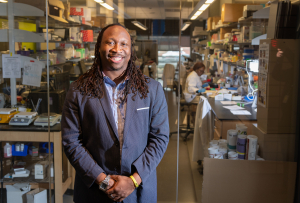
“Powers (and Problems) of Proteases in Tissue Destructive Diseases”
Professor, Biomedical Engineering
Associate Chair for Graduate Studies
Georgia Institute of Technology
Abstract: Dr. Platt’s research centers on proteolytic mechanisms of tissue remodeling during disease progression using both experimental and computational approaches. Many of his diseases of focus are health disparities in the U.S., but global health concerns: pediatric strokes in sickle cell disease, HIV-mediated cardiovascular disease, predictive medicine for breast cancer, and also COVID-19. His research has taken him to South Africa and Ethiopia for collaborative work to find solutions for low resource settings, which have broadened opportunity and forced creative solutions. Centered agents are the cysteine cathepsins, which are the most potent mammalian collagenases and elastases, but cathepsin pharmacological inhibitors continue to fail human clinical trials, mostly due to unexpected side effects. This suggests there are underlying regulatory behaviors or feedback loops yet to be elucidated. During this seminar, Dr. Platt will discuss 1) experimental and computational tools to better quantify and model protease activity, 2) concept of a proteolytic network in tissue destructive diseases, and 3) fundamental insights and consequences of the underlying enzymology to improve pharmacological targeting and application for multiple diseases.
Bio: Dr. Manu Platt received his B.S. in Biology from Morehouse College in 2001 and his Ph.D. from the Georgia Tech and Emory joint program in biomedical engineering in 2006. He finished his postdoctoral training at MIT prior to returning to Georgia Tech and Emory in the joint department of Biomedical Engineering in 2009. His research centers on proteolytic mechanisms of tissue remodeling during disease progression using both experimental and computational approaches. These diseases of focus are health disparities in the U.S., but global health concerns: pediatric strokes in sickle cell disease, personalized and predictive medicine for breast cancer, and HIV-mediated cardiovascular disease, which has taken him to South Africa and Ethiopia for collaborative work to find solutions for low resource settings. His work has been funded by NIH Director’s New Innovator Award, International AIDS Society, Georgia Cancer Coalition, and the National Science Foundation. Integrated with his research program are his mentoring goals of changing the look of the next generation of scientists and engineers. Aligned with that goal, Dr. Platt, with Bob Nerem, co-founded and co-directs Project ENGAGES (Engaging the Next Generation At Georgia Tech in Engineering and Science), a program paying African-American high school students from Atlanta Public Schools to be researchers in Georgia Tech labs since 2013.
@DrPlattLab









